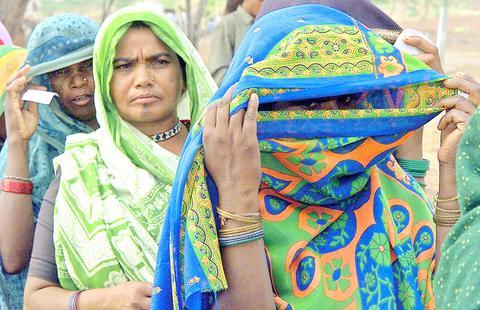Voters in the Himalayas lined up in heavy rain while counterparts in the arid Indian capital waited for their daily water delivery before heading to the polls in yesterday's fifth and final phase of parliamentary elections in the world's largest democracy.
Although exit polls and voter surveys placed Prime Minister Atal Bihari Vajpayee's National Democratic Alliance (NDA) far ahead of the main opposition Congress party and its allies, most pollsters have predicted that the 11-party coalition will fall short of the 272 seats it needs for a majority in the lower house of parliament, the Lok Sabha.

PHOTO: REUTERS
But polls and surveys have been wrong in previous Indian elections.
"It's still wide open," the Times of India said in a front-page headline.
Vajpayee's coalition, led by his Hindu nationalist party, has been bolstered by a booming economy, moves toward peace with rival Pakistan and pledges to further modernize India. Congress and its allies have campaigned for a more secular government and championed the rural poor, who they say have been left out of India's new prosperity.
Balloting was being held in 16 states yesterday, the last of five polling days spread over three weeks.
Overall results are expected on Thursday, when tallies of more than 350 million votes will be taken from millions of electronic voting machines that replaced paper ballots across India for the first time. The voter turnout has averaged 55 percent.
If the NDA fails to win a majority, it will be forced into horse-trading with smaller parties or independents to form a government. That raises the risk of an unstable government, which may not last a full term or be able to implement its policies.
The continuing peace process with nuclear-armed rival Pakistan is not expected to be influenced by the result, no matter who forms the next government.
"Everybody knows that the dividends of peace with Pakistan are huge and range from big cuts in defense spending to large gains from trade," the Times of India said.
Indian President A.P.J. Abdul Kalam was among the first to vote, showing off his ink-stained finger as proof, and commenting, "I feel beautiful to exercise my right to vote."
Sonia Gandhi, the Italian-born leader of the main opposition Congress party, voted early, behind a cardboard screen in a small side-room of a government building.
"Let the results come. We will see what happens after that," she said.
In the New Delhi suburb of Vasant Kunj, where water is scarce, voters waited for water deliveries before going to the polls.
"We have come to exercise our franchise only after making sure our tanks are filled," said air force Wing Commander S.C. Gupta.
He said politicians "come here seeking votes, but never address our perennial problem of acute water shortage."
In the Himalayan state of Sikkim, bordering China, heavy rains poured down, but, "There is tremendous enthusiasm for voting. Even the Buddhist monks have started turning out for voting much before the balloting began," said Tashi Bhutan, a community leader in Gangtok, capital of the Buddhist-majority state.
About 1 million troops were guarding polling booths, some carrying video cameras to discourage fraud and violence.

A fire caused by a burst gas pipe yesterday spread to several homes and sent a fireball soaring into the sky outside Malaysia’s largest city, injuring more than 100 people. The towering inferno near a gas station in Putra Heights outside Kuala Lumpur was visible for kilometers and lasted for several hours. It happened during a public holiday as Muslims, who are the majority in Malaysia, celebrate the second day of Eid al-Fitr. National oil company Petronas said the fire started at one of its gas pipelines at 8:10am and the affected pipeline was later isolated. Disaster management officials said shutting the

US Vice President J.D. Vance on Friday accused Denmark of not having done enough to protect Greenland, when he visited the strategically placed and resource-rich Danish territory coveted by US President Donald Trump. Vance made his comment during a trip to the Pituffik Space Base in northwestern Greenland, a visit viewed by Copenhagen and Nuuk as a provocation. “Our message to Denmark is very simple: You have not done a good job by the people of Greenland,” Vance told a news conference. “You have under-invested in the people of Greenland, and you have under-invested in the security architecture of this

UNREST: The authorities in Turkey arrested 13 Turkish journalists in five days, deported a BBC correspondent and on Thursday arrested a reporter from Sweden Waving flags and chanting slogans, many hundreds of thousands of anti-government demonstrators on Saturday rallied in Istanbul, Turkey, in defence of democracy after the arrest of Istanbul Mayor Ekrem Imamoglu which sparked Turkey’s worst street unrest in more than a decade. Under a cloudless blue sky, vast crowds gathered in Maltepe on the Asian side of Turkey’s biggest city on the eve of the Eid al-Fitr celebration which started yesterday, marking the end of Ramadan. Ozgur Ozel, chairman of the main opposition Republican People’s Party (CHP), which organized the rally, said there were 2.2 million people in the crowd, but

JOINT EFFORTS: The three countries have been strengthening an alliance and pressing efforts to bolster deterrence against Beijing’s assertiveness in the South China Sea The US, Japan and the Philippines on Friday staged joint naval drills to boost crisis readiness off a disputed South China Sea shoal as a Chinese military ship kept watch from a distance. The Chinese frigate attempted to get closer to the waters, where the warships and aircraft from the three allied countries were undertaking maneuvers off the Scarborough Shoal — also known as Huangyan Island (黃岩島) and claimed by Taiwan and China — in an unsettling moment but it was warned by a Philippine frigate by radio and kept away. “There was a time when they attempted to maneuver